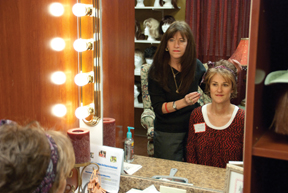Story By Ashleigh Schmitz
Photos By William DeWitt
Almost 10 years after recovering from breast cancer, Deborah Deaton heard what no woman wants to hear: “Your breast cancer has returned, and it’s worse this time.”
“That time sent me to the deep end,” Deborah said. “They told me it was more aggressive. They talked about a mastectomy, not a lumpectomy. I just wasn’t ready to die. That’s exactly what I told the doctor when I left the first day.”
Deborah came to the American Cancer Society and the Look Good . . . Feel Better program after her second breast cancer diagnosis. Deborah’s first diagnosis was caught in 1997 at stage 1 and only a lumpectomy was necessary.
Since Deborah’s first diagnosis led to a quick recovery, when she was diagnosed the second time she wanted to know what would happen.
“I met with American Cancer Society and had them mail me everything on breast cancer,” she said. “I had enough knowledge to question what my doctor was doing. It’s your life and it’s your decision; you need to be a part of making your own conclusions.”
More than anything, Deborah thought about her 39-year-old blind son, John Parker.
“He was as scared as I was,” she said. “He’s my only son. We’ve always been very close.”
During Deborah’s second bout with the disease, John was her main caregiver, staying by his mother’s side through everything cancer treatment brings.
“He was there 24 hours; he was there when I was hugging the toilet,” Deborah said. “I don’t know what I would have done without him.”
John said that he did whatever his mom needed, whether he ran errands with his grandmother or helped wash her when she needed it.
The help from family was well received, but it couldn’t put Deborah back together physically. After turning to the American Cancer Society, Deborah found the Look Good … Feel Better program. Here she rediscovered her confidence.
The program showed her how to apply makeup even though she did not have eyelashes or eyebrows. When Deborah’s hair started falling out Look Good … Feel Better provided her with a free wig and showed her how to use scarves and hats when it got hot.

The program also holds seminars with a cosmetologist and provides bags of makeup samples that different sponsors donate. Deborah said having the stylist there to guide her and show her how to apply the makeup made all the difference in how she felt about her appearance.
“They show you how to accentuate the positives and forget about what’s not there – even having to wear a prosthetic; that was the most traumatic of all,” Deborah said. “After my [mastectomy] I wouldn’t look at myself in the mirror. Getting in the shower, oh Lord! It took my mom to force me to get out of bed and in the shower.”
But Deborah soon realized she wasn’t alone.
“Once I got around other ladies who lost a breast who were dealing with it, things changed. This program helped me realize I was still the same person I was before,” she said. “They showed me that I could still be a complete person.”
Look Good … Feel Better also helped Deborah realize that being bald was beautiful. Rather than let her hair fall out while at church or at work, Deborah took control and decided to shave her head. She planned one day to meet at the hair salon with her sister-in-law, but instead her entire family showed up to give their support. What began as a day to take care of another aspect of her disease turned into a fun family event.
“As the stylist was cutting my hair, it was probably below the ear, halfway down the neck. As she cut we went shorter and my sister said, ‘Let’s do a mohawk.’ She put the hardening cream on it and I looked like a rock concert person,” Deborah said. “Then we shaved it totally smooth.”
Deborah was not the only one to shave her head that day; her son John showed his support by having his head shaved, too.
While Deborah is a survivor, she is not yet in remission. Regardless, Deborah feels so grateful for everything the American Cancer Society has helped her with that she now volunteers with one of its programs. She meets with women who are newly diagnosed with breast cancer and draws from her experience to answer their questions and address their concerns.
She recalls having many of the same questions at the beginning of her diagnoses: What am I going to do? Where do I get the bra? How do I get the prosthetic? One of the many reasons, Deborah believes, that God left her here is so that she can help other women.
“One woman was alone. She didn’t know where to get a prosthetic; she didn’t have a support group,” Deborah said. “It just makes you feel better because you’re able to give back.”

